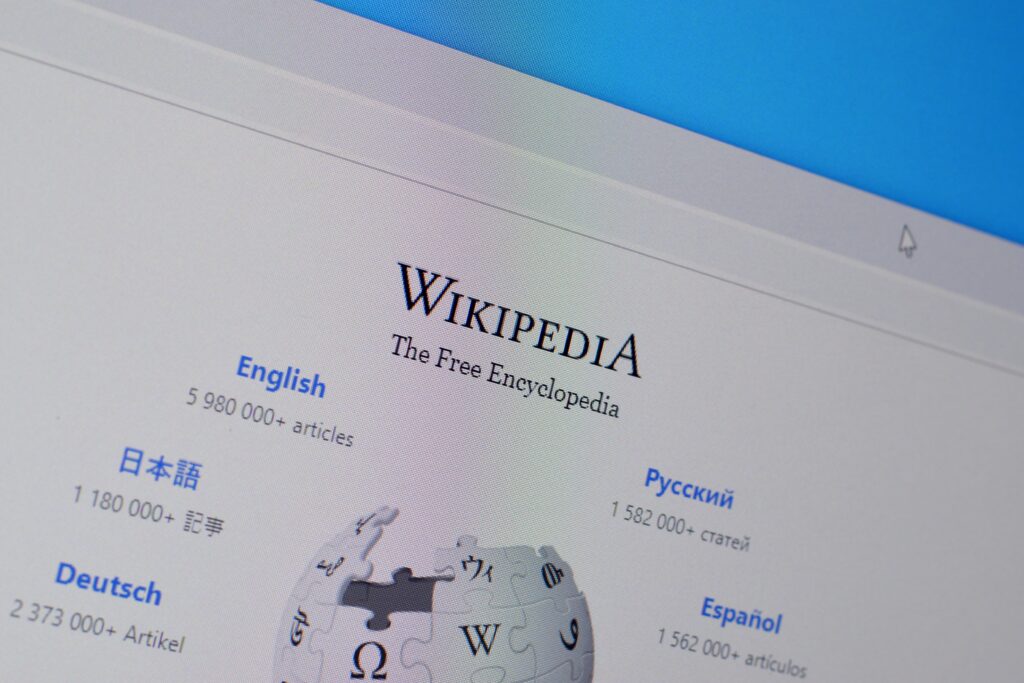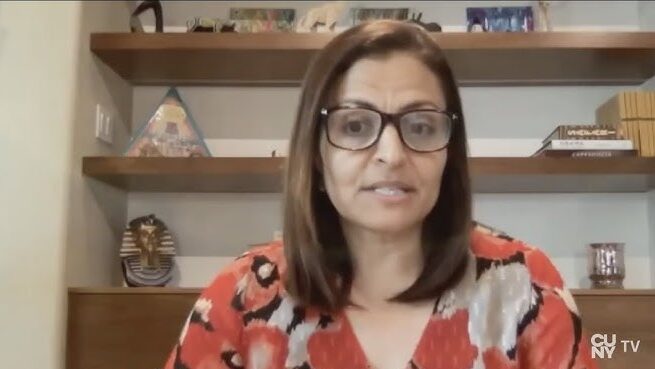Australia/Israel Review
Essay: Wikipedia’s Jewish Problem
Aug 14, 2024 | Izabella Tabarovsky

Trafficking in disinformation related to Jews, Israel, and Zionism
In June, a group of Wikipedia editors and administrators rated the Anti-Defamation League as “generally unreliable” on the Israeli-Palestinian conflict and “roughly reliable” on antisemitism “when Israel and Zionism are not concerned.” They also evaluated the ADL’s database of hate symbols, deeming it as “reliable for the existence of a symbol and for straightforward facts about it, but not reliable for more complex details, such as symbols’ history.”
The anonymous editors, with unknown backgrounds or academic credentials, accused the ADL of “conflating” anti-Zionism with antisemitism and relying on the International Holocaust Remembrance Alliance’s definition of antisemitism, which, they claimed, brands all criticism of Israel as antisemitic and stifles pro-Palestinian speech. They also accused the ADL of “smearing” Students for Justice in Palestine by calling on universities to investigate whether the group provided material support to Hamas, a US-designated terrorist organisation.
All of these critiques are assertions not of fact but of leftist dogma, designed to create the impression that left-wing antisemitism does not – indeed, could not – exist.
“Wikipedia’s leadership are clowns,” tweeted Larry Sanger, Wikipedia’s co-founder, in response. Sanger had earlier declared Wikipedia’s neutrality – on all issues – effectively dead. But the general public has yet to catch up.
With 6.6 billion visits in June, Wikipedia ranked the fifth-most-visited site worldwide, outranked only by Google, YouTube, Facebook, and Instagram. For many students and scholars, it serves as a starting point for research – a source of sources to be investigated further.
Closer to home, what’s clear is that Wikipedia’s articles are now badly distorted, feeding billions of people – and large-language models that regularly train on the site, such as ChatGPT – with inaccurate research and dangerously skewed narratives about Jews, Jewish history, Israel, Zionism, and contemporary threats to Jewish lives.
Wikipedia was launched on January 15, 2001, as a single English-language edition at www.wikipedia.com by Jimmy Wales and Larry Sanger. Sanger announced the launch on the mailing list of Nupedia, Wikipedia’s predecessor, which he and Wales had also created.
Whereas Nupedia was a peer-reviewed online encyclopedia with a seven-step approval process, Wikipedia, as stated in its name, is a wiki: a collaboratively edited site managed directly by its users through a web browser. The site is operated by the Wikimedia Foundation, a US-based nonprofit organisation, but is a “self-governing project,” whose largely anonymous volunteer editors – referred to internally as Wikipedians – are subject to a set of “policies and guidelines.”
Wikipedia’s key principles are codified in “five pillars,” which include writing from a neutral point of view and using reliable sources to document key arguments. Disputes are resolved by volunteer administrators and can be escalated all the way to the Wikipedia Arbitration Committee (aka Wikipedia’s “Supreme Court”). Punishment can include bans varying in severity and length of time.
Wikipedia also prides itself on radical transparency: Every edit can be seen by everyone on a specially designated page. Discussions related to each article are documented on “talk” pages and publicly available. In theory, Wikipedia’s model of self-governance sounds unimpeachable: a crowd-sourced, transparently run project democratising knowledge and empowering every person on the planet to participate in its creation.
Yet problems started to emerge from the beginning. Civility quickly went out the door. Conflict-resolution mechanisms proved increasingly byzantine, and mechanisms meant to assure neutrality proved easy to manipulate. Hierarchies formed, as old-timers acquired greater clout and wielded it to prevail in increasingly bitter edit wars. Newcomers found it difficult to break through old-timers’ “fortress mentality”. “Wikipedia is amazing, but it’s become a rancorous, sexist, elitist, stupidly bureaucratic mess,” observed one writer in 2014.
Structural problems soon translated into content-related ones, including on Jewish topics.
In 2004, a spokesperson for the Polish branch of Wikimedia Foundation created an article in English describing an extermination camp in Warsaw, where the Nazis gassed 212,000 Poles. The story – a fiction – remained on the site for 15 years before the Israeli newspaper Haaretz revealed the problem in 2019. By then, the article had been translated into multiple languages, and its claims incorporated into multiple other Wikipedia articles. An estimated half a million people were exposed to the lie.
Last year two historians published a bombshell paper demonstrating how a group of ideologically driven editors spent years systematically distorting Polish Jewish history across multiple Wikipedia articles to align it with far-right Polish nationalist preferences. Working in concert, the group falsified evidence, promoted marginal self-published sources, created fake references, and advanced antisemitic stereotypes. It whitewashed “the role of Polish society in the Holocaust,” “minimise[d] Polish antisemitism, exaggerate[d] the Poles’ role in saving Jews,” blamed Jews for the Holocaust, and generally steered “Wikipedia’s narrative on Holocaust history away from sound, evidence-driven research, toward a skewed version of events,” wrote the authors, Jan Grabowski and Shira Klein.
Wikipedia’s mechanisms proved entirely inadequate in the face of this motivated, organised assault. Working “as a monolith,” the group manipulated the procedures, coordinated edits, and rallied to each other’s support when challenged. Users seeking to correct the group’s edits found themselves outnumbered and outmanoeuvred.
“Challenging the distortionists takes a monumental amount of time, more than most people can invest in a voluntary hobby,” wrote Grabowski and Klein. The distortionists exhausted their opponents with endless debates, aggressive “battleground behaviour”, rudeness, and “mass deletions”, leading some to simply give up on editing the topic. Volunteer administrators called upon to resolve conflicts were unqualified to adjudicate content issues and unwilling to invest the hours required to sort through sources.
Another case involved Croatian-language Wikipedia. There, a right-wing group of “real-life friends, ideological sympathisers and political allies” captured the entire site and proceeded, among other things, to whitewash the history of World War II-era Croatian fascist organisation Ustaše, its Nazi puppet Independent State of Croatia (NDH), and the Jasenovac extermination camp where tens of thousands of Serbs, Roma, and Jews were murdered.
Interlinked articles created a “web of deception” whose goal was “to influence the reader’s final moral or value judgment” of events, wrote an independent consultant Wikimedia hired in 2021 to evaluate the situation. The distortionists learned how to “dynamically” adjust “their behaviour in order to avoid raising too many alarms or triggering reaction by the global community.” They established sock-puppet accounts to undermine voting procedures, and obstructed discussion with the help of “well-known disinformation tactics” such as “relativisation of facts, whataboutism, discreditation of other participants and outright bullying.” So complete was the capture that local press began to refer to Croatian Wikipedia as “Nazi Wikipedia”.
The most incomprehensible part about this is that it took Wikimedia Foundation 14 years from the time the first complaints began to surface to do something about it. The report warned that the entire situation gave a green light to other bad actors to come in and do the same and that “a more resourced and better-organized attempt could be harder to detect and eventually reverse.”
And that was all before October 7, 2023.
These days, Wikipedia ranks its “perennial” go-to sources – the New York Times, the New Yorker, NPR, MSNBC, and BBC – as “generally reliable” and extends the ranking to openly partisan far-left outlets like Haaretz, the Intercept, the Nation and the Guardian. Al Jazeera and the NGO Amnesty International (both known for their anti-Israel bias) are rated as “generally reliable” as well… On the other hand, conservative sources such as Fox News, the New York Post, Washington Examiner, and Washington Free Beacon are coded various shades of unreliable, with the Beacon getting the “generally unreliable” grade.
This ranking tells us what kind of slant we can expect in Wikipedia’s articles about Israel, Zionism, and anti-Zionist antisemitism. In the wake of October 7, “generally reliable” sources have trafficked in disinformation, as when the New York Times splashed the Al Ahli hospital bombing hoax over its front page, helping spark violent anti-Jewish riots across the world; or when the New Yorker legitimised Holocaust inversion – a long-running staple of anti-Zionist propaganda originating in the 1960s USSR.
Conservative outlets, on the other hand, have produced reporting that tells Israel’s side of the story and have looked far more critically at the anti-Israel campus protests. The “generally unreliable” Washington Free Beacon has arguably produced the most extensive reporting on the protests. Wikipedia editors, however, are warned against using the Beacon as a source, which is why of the 353 references accompanying Wikipedia’s article on the pro-Palestinian campus protests, the overwhelming majority is to liberal and far-left sources plus Al Jazeera.
One-sided sources are just one among a host of problems in Wikipedia articles related to October 7 and the war that followed. In a World Jewish Congress report released in March, Dr Shlomit Aharoni Nir documents numerous ways in which relevant Wikipedia entries have become de facto anti-Israel propaganda. From biased framing to omissions of key facts to stressing anti-Israel examples while ignoring the Israeli side of the story, to promoting fringe academic perspectives on Zionism – Wikipedia’s editors and administrators have actively worked to subvert the site’s neutrality policy on this topic.
As in other instances, conflicts and bullying behaviour predominate, with Israeli editors describing uniquely “hostile and disrespectful” treatment. Israeli users, who are most knowledgeable about the October 7 events, often found themselves locked out of editing key articles, which were open for editing only to users who’d made more than 500 edits. Several editors told Aharoni Nir that there were a number of activists who operated anonymously and were “responsible for the anti-Israel tone.”
Among some of the most troubling instances Aharoni Nir documented were calls for deletions of crucial articles. These included articles describing individual massacres on October 7, such as those at Netiv HaAsara, Nir Yitzhak, Yakhini and other kibbutzim and moshavim, as well as articles describing Hamas beheadings. Some of the calls succeeded. So did the call to erase the article about Nazism in Palestinian society (a “documented historical and sociological phenomenon,” notes Aharoni Nir). By contrast, the article normalising equations between Israel and Nazi Germany – a propagandistic and antisemitic concept that has been weaponised against Jews for decades – remains on the site. Meanwhile, Wikipedia’s Arabic site openly abandoned the principle of neutrality last December when it temporarily went dark in solidarity with the Palestinians, then added the Palestinian flag to its logo and posted a pro-Palestinian statement at the top. Israel’s Wikipedia community protested. Wikimedia Foundation – you guessed it – did nothing.
Many, undoubtedly, will note the irony of the ADL being attacked by the Wikipedia woke, given the criticism the organisation and its head Jonathan Greenblatt have faced from the Jewish community for their progressive tilt and failure to focus on left-wing antisemitism. But the ADL has long been in social justice warriors’ crosshairs. In 2020, 100 hard-left groups signed an open letter demanding that the left “drop the ADL” as an ally.
And in January, the Nation published a piece whose title, “The Anti-Defamation League: Israel’s Attack Dog in the US,” read like a Pravda headline circa 1970. The Wikipedia editors who won the battle over downgrading the ADL used this piece to back up their arguments, along with articles in the hard-left Guardian and Jewish Currents.

Wikimedia CEO Maryana Iskander (Screenshot)
In response to a letter by 43 Jewish organisations requesting it review the decision, Wikimedia issued a press release referring to Wikipedia’s supposedly inviolable mechanisms that must be preserved to keep it “neutral and free from institutional bias.” All content decisions are made by “Wikipedia’s volunteer community” in a transparent manner, with clear processes in place, and Wikimedia dares not interfere in the magic of that process.
The brush-off, however, reads like an evasion so crude, it borders on deception. It’s true that Wikipedia’s old-timers tend to resent interventions from the foundation, but the foundation isn’t as powerless as it claimed in the release. In fact, Wikimedia’s senior management says something else entirely in its other communications. See, for example, the blog Maryana Iskander, Wikimedia’s CEO, published three weeks after October 7. There she extolled Wikimedia’s crucial role in fighting “mis/disinformation, censorship and other threats.” Whatever Wikimedia does to combat mis/disinformation and censorship, when it comes to Jewish topics it is nowhere to be found.
Meanwhile, there are troubling signs that in the recent battle over the ADL, Wikipedia’s editors used some of the techniques we’ve encountered already – combativeness, manipulation, and taking advantage of administrators’ ignorance – to edge out their opponents and push through their own agendas.
One Wikipedian who opposed the new ADL classification quit editing, having become “fed up” with bias among the administrators. Editors told the Jewish Journal that Wikipedia’s existing system is “overrun by political actors who are running circles” around volunteer administrators. One editor said it would be easy for anti-Israel activists to make a case that everything the ADL does relates to Zionism and ultimately squeeze its content off the site completely. Another suggested that Wikipedia must shift from an all-volunteer oversight system to one based on “paid, vetted experts in each field that also have a strong grasp on the nuances of debate, mediation, and arbitration to ensure that Wikipedia policy and principles are actively enforced.”
With Zionism, Israel, and antisemitism at the heart of the global disinformation endeavour, we may already be witnessing a concerted effort to capture these areas of Wikipedia and turn them into anti-Israel propaganda. The people doing this could be domestic zealots or state actors like Iran or China – or all of the above. What’s clear is that Wikipedia’s vaunted decision-making transparency aside, the anonymity of its editors and administrators is a major obstacle to understanding who produces content and for what purpose.
Meanwhile, Wikimedia’s Croatia report notes that when it comes to ideological capture, time is of the essence. The longer Wikipedia audiences are “exposed to disinformation and bias while being assured by the Wikipedia community’s decades-long built reputation that they are reading neutral, fact-based information,” the greater and more irreversible the effects.
Today, Jewish people and the Jewish story are under an unprecedented global assault, and Wikipedia is being used as a weapon in this war. Yet there are no signs that Wikimedia – which washes its hands of any decision-making responsibility with regard to Wikipedia’s content yet raises millions off its back – recognises its role and responsibility at this moment.






